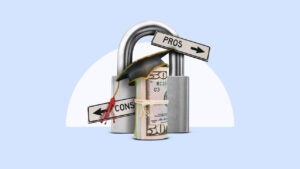Pros and cons of consolidating student loans

Key takeaways
- Direct Consolidation Loans can make federal student loans more manageable by rolling several balances into a single loan.
- Using a Direct Consolidation Loan for federal loans may give you access to new repayment options, depending on the types of loans you consolidate.
- You could pay more interest over time if the loan term is extended when you consolidate.
Consolidating your student loans involves combining some or all of your federal loan balances with a Direct Consolidation Loan. It can make your federal loans more manageable.
Consolidation can be a great way of staying on top of your monthly payments. Switching to a Direct Consolidation Loan may also help you access federal student loan repayment and forgiveness plans. That said, there are times when consolidating may not be the best idea.
Consolidating student loans pros and cons: Quick look

Pros
- Potentially lower monthly payments.
- One payment per month.
- Access repayment plans.
- Retain federal benefits.

Cons
- Pay more interest over time.
- No lower interest rate.
- Lose progress toward federal forgiveness programs.
- Interest is added to your balance.
Pros of consolidating student loans
Consolidating student loans is a smart step for many federal borrowers for these reasons.
- Potentially lower monthly payments: Direct Consolidation Loans have a repayment timeline of up to 30 years, as opposed to the standard repayment period of 10 years. This longer repayment term can make your loans more manageable by lowering your monthly payment.
- One payment per month: Instead of making multiple student loan payments on your federal loans, you’ll make one every month, whether you consolidate with a Direct Consolidation Loan or with a private loan. If this move helps you avoid late payments, your credit score could rise over time, and it could reduce the possibility of extra interest accruing.
- Access repayment plans: Some older student loans, such as FFEL loans and Perkins Loans, are not eligible for certain income-driven repayment plans or Public Service Loan Forgiveness (PSLF) unless consolidated. Combining those loans into a Direct Consolidation Loan can open up access to those programs.
- Retain federal benefits: While some borrowers may consider refinancing their loans with a private lender as a way of combining several loans, choosing a Direct Consolidation Loan instead ensures that you retain federal benefits like forbearance, income-driven repayment and hardship relief options.
Cons of consolidating student loans
While consolidating can be a helpful approach, there are still some drawbacks to be aware of before making the decision:
- Pay more interest over time: Choosing to pay off your loan over 30 years will lower your monthly payment but cost you more in interest over time. You’ll also be in debt for longer, which could impact your other financial priorities. However, if your budget allows, you can pay more than your set monthly minimum in an effort to reduce your principal and pay less interest over the life of the loan.
- No lower interest rate: The primary draw of refinancing is that you can often find a lower interest rate than what you’re currently paying. But with Direct Consolidation Loans, your interest rate is calculated as the weighted-average interest rate of the loans you’re consolidating, rounded up to the nearest one-eighth of a percent. Because of this, your interest rate could be slightly higher than what you’re currently paying, which will cost you more over the life of the loan.
- Lose progress toward federal forgiveness programs: Consolidating into a Direct Consolidation Loan could cause you to lose your progress on federal programs like PSLF or an existing income-driven repayment plan. Make sure to check with your servicer before consolidating so you don’t erase years of progress toward forgiveness.
- Interest is added to your balance: If you have any unpaid interest on the federal loans you’re consolidating, that interest will be added to your principal balance when you consolidate. Interest will then accrue on this higher balance.
Should I consolidate my student loans?
Consider loan consolidation carefully. Whether or not you should consolidate your student loans depends on your loan type and financial circumstances.
You should consolidate if:
- You have old FFEL or Perkins Loans and want to pursue loan forgiveness.
- You’re having trouble keeping track of your monthly payments.
You should reconsider consolidation if:
- You don’t owe much toward your student loans or can pay off your balances quickly.
- You’re close to meeting the requirements for a loan forgiveness program.
- You qualify for federal loan forgiveness.
Can I consolidate my private student loans?
You can combine private student loans, but this isn’t typically referred to as consolidation — that term is reserved for combining federal student loans with a Direct Consolidation Loan. Private loan refinancing can combine multiple private student loans with one new private loan. This could help simplify payments and potentially negotiate a lower monthly bill.
Should I refinance or consolidate my federal loans?
One of the biggest benefits of student loan consolidation with a Direct Consolidation Loan is that it keeps your federal student loans with the Department of Education. While consolidation won’t necessarily save you money, it ensures that you retain access to benefits like hardship payment options and debt-relief programs.
That said, some borrowers may choose to refinance instead of consolidating. When you refinance, your federal loans will turn into private loans, so you’ll lose federal benefits. However, refinancing could get you a much lower interest rate on your loans, which could help you pay them off faster and more cheaply. Be sure to run the numbers with a student loan refinancing calculator first to ensure it’s the right move.
Before jumping to refinance, look at the entire portfolio of options offered by the Department of Education. There may be forgiveness programs you didn’t know existed that you could qualify for.
Bottom line
Before applying to consolidate your federal student loans, consider what you stand to gain or lose. Once you’ve evaluated your finances and have decided that it’s the route for you, you’ll contact your loan servicer to pursue the next steps.
Why we ask for feedback Your feedback helps us improve our content and services. It takes less than a minute to complete.
Your responses are anonymous and will only be used for improving our website.
You may also like

Types of private student loans and how to choose

Can you refinance Sallie Mae student loans?

Pros and cons of private student loans



